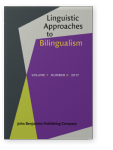Commentary
Are these approaches incompatible?
References (13)
References
Birdsong, D. (2005). Interpreting age effects in second language acquisition. In J. F. Kroll & A. M. B. DeGroot (Eds.), Handbook of bilingualism: Psycholinguistic approaches (pp. 109–128). New York, NY: Oxford University Press.
Goldstone, R., Feng, Y., & Rogosky, B. (2004). Connecting concepts to each other and the world. In R. Zwaan & D. Pecher (Eds.), The grounding of cognition: The role of perception and action in memory, language, and thinking. Cambridge: Cambridge University Press.
Hernandez, A., Li, P., & MacWhinney, B. (2005). The emergence of competing modules in bilingualism. Trends in Cognitive Sciences, 91, 220–225. 

MacWhinney, B. (2005). A unified model of language acquisition. In J. F. Kroll & A. M. B. de Groot (Eds.), Handbook of bilingualism: Psycholinguistic approaches (pp. 49–67). New York, NY: Oxford University Press.
MacWhinney, B. (2014). Item-based patterns in early syntactic development. In T. Herbst, H. -J. Schmid & S. Faulhaber (Eds.), Constructions Collocations Patterns (pp. 33–70). Berlin: de Gruyter Mouton.
MacWhinney, B. (in press-a). Entrenchment in second language learning. In H. -J. Schmid (Ed.), Entrenchment, memory and automaticity: The psychology of linguistic knowledge and language learning. New York: American Psychological Association. 
MacWhinney, B. (in press-b). A unified model of first and second language learning. In M. Hickmann & M. Kail (Eds.), Language acquisition. New York, NY: John Benjamins.
Pierce, L. J., Klein, D., Chen, J. -K., Delcenserie, A., & Genesee, F. (2014). Mapping the unconscious maintenance of a lost first language. Proceedings of the National Academy of Sciences, 111(48), 17314–17319. 

Yang, C. (2016). The price of linguistic productivity: How children learn to break the rules of language. Cambridge, MA: MIT Press. 

Cited by (1)
Cited by one other publication
Ahn, Hyunah
2021.
From Interlanguage grammar to target grammar in L2 processing of definiteness as uniqueness.
Second Language Research 37:1
► pp. 91 ff.

This list is based on CrossRef data as of 5 july 2024. Please note that it may not be complete. Sources presented here have been supplied by the respective publishers.
Any errors therein should be reported to them.
